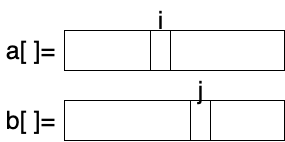Union if Two Sorted Array
Input: a[] = {13, 15, 18} b[] = {12, 18, 19, 20, 25} Output: c[] = {12, 13, 15, 18, 19, 20, 25}
Input: a[] = {12, 13, 13, 13, 14, 14} b[] = {14, 14} Output: c[] = {12, 13, 14}
Naive Approach
package main
import (
"fmt"
"sort"
)
func main() {
a := []int{3, 5, 10, 10, 10, 15, 15, 20}
b := []int{5, 10, 10, 15, 30}
res := union(a, b)
fmt.Println(res) //[3 5 10 15 20 30]
}
func union(a, b []int) (res []int) {
c := make([]int, len(a)+len(b))
for i := 0; i < len(a); i++ {
c[i] = a[i]
}
m := len(a)
for j := 0; j < len(b); j++ {
c[m+j] = b[j]
}
sort.Ints(c)
for i := 0; i < len(c); i++ {
if i == 0 || c[i] != c[i-1] {
res = append(res, c[i])
}
}
return res
}
Time Complexity: O((m+n)*log(m+n))
Dry Run: a[] = {3, 5, 5} b[] = {1, 5, 7, 7}
After 1st loop: c[] = {3, 5, 5, , , , } After 2nd loop: c[] = {3, 5, 5, 1, 5, 7, 7} After sorting: c[] = {1, 3, 5, 5, 5, 7, 7} 3rd loop: res[] = {1, 3, 5, 7}
Efficient Solution
Implementation Idea

if i > 0 && a[i] == a[i-1] { i++; continue; } if j > 0 && b[j] == b[j-1] { j++; continue; } if a[i] < b[j] { c=append(c,a[i]); i++ } if a[i] > b[j] { c=append(c,b[j]); j++ } if a[i] == b[j] { c=append(c,a[i]); i++; j++ }
Implementation
package main
import (
"fmt"
)
func main() {
a := []int{3, 5, 10, 10, 10, 15, 15, 20}
b := []int{5, 10, 10, 15, 30}
res := union(a, b)
fmt.Println(res) //[3 5 10 15 20 30]
}
func union(a, b []int) (res []int) {
m := len(a)
n := len(b)
i, j := 0, 0
for i < m && j < n {
if i > 0 && a[i] == a[i-1] {
i++
continue
}
if j > 0 && b[j] == b[j-1] {
j++
continue
}
if a[i] < b[j] {
res = append(res, a[i])
i++
} else if a[i] > b[j] {
res = append(res, b[j])
j++
} else {
res = append(res, a[i])
i++
j++
}
}
for i < m {
if i == 0 || a[i] != a[i-1] {
res = append(res, a[i])
}
i++
}
for j < n {
if j == 0 || b[j] != b[j-1] {
res = append(res, b[j])
}
j++
}
return
}
Dry Run
a[] = {12, 20, 30, 30}
b[] = {13, 30, 40}
i=0; j=0;
1st Iteration: c[] = {12}, i=1
2nd Iteration: c[] = {12, 13}, j=1
3rd Iteration: c[] = {12, 13, 20}, i=2
4th Iteration: c[] = {12, 13, 20, 30}, i=3, j=2
5th Iteration: c[] = {12, 13, 20, 30}, i=4
Next Loop for(j < n): c[] = {12, 13, 20, 30, 40}, j=3